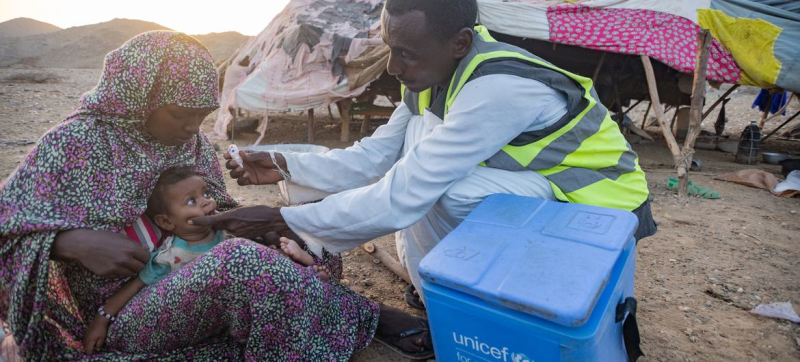- Dhaka’s Per Capita Income Rises to USD 5,163 |
- DSE turnover dips 18% despite weekly gains in key indices |
- 65 Nations Sign UN Treaty to Combat Cybercrime Globally |
- Dhaka’s air quality ‘unhealthy’ 5th worst in world Saturday |
- Dhaka’s air recorded unhealthy on Friday morning |
WHO Urges Global Push to Eradicate Polio Once and For All

A baby is vaccinated against polio in a remote region of Red Sea state in Sudan.
Thirty-five years ago, polio, a highly infectious viral disease, paralysed around 350,000 children per year. Following a UN-led international push, that number is now less than 50.
In 1988, the international community united under the World Health Organization’s (WHO) leadership with the goal of eradicating polio. World Polio Day, observed on 24 October, raises awareness about the progress made and the challenges that remain in ending its spread.
Polio can invade the nervous system and cause paralysis, most often in children.
“Decades ago, the world overcame geopolitical and geographic barriers to end smallpox. Let's do the same for polio. Let's finish the job,” said WHO Director-General Tedros Adhanom Ghebreyesus.
Three decades ago, the Global Polio Eradication Initiative was established and is now led by the WHO alongside other non-US organisations and governments.
Since the launch of the initiative, the number of polio cases has dropped by more than 99 per cent, with only 36 cases reported so far in 2025.
Certain regions of the world, however, are still struggling to eradicate polio, and those that have succeeded must continue to support public health authorities in disease monitoring and prevention, WHO says.
Dr. Catharina Boehme, who heads WHO in Southeast Asia, called upon member states to recommit to immunisation campaigns and invest in surveillance and health systems.
“Together, we can protect every child from polio, everywhere — and build a healthier and more resilient future for all,” she said.
While the WHO European region achieved polio-free status in 2002 and has remained free of endemic spread of the virus since then, vaccination coverage in the area declined in 2024, leaving over 450,000 babies unprotected.
In Afghanistan, a ban on house-to-house immunisation has resulted in over one million children being missed in southern areas by polio vaccination campaigns since May 2018, according to the WHO’s Polio Eradication Strategy 2022–2026.
As a result, in 2019 and 2020, 90 per cent and 75 per cent of Afghanistan’s type 1 polio cases, respectively, originated in areas not currently accessible for vaccination.
“Gaps in immunisation coverage leave children vulnerable and present a health security risk to our region and beyond.
“We must not return to a time when polio regularly threatened lives and overwhelmed health systems,” said Ihor Perehinets, WHO/Europe regional emergency director.

